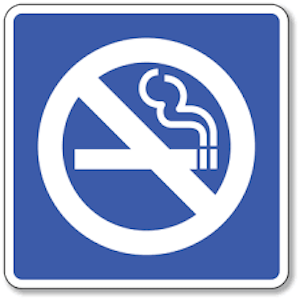URI’s Tobacco-Free Committee, co-chaired by Health Sciences Associate Dean Deb Riebe, seeks healthier, cleaner community
 There is strong support among students, faculty and staff for a University of Rhode Island free of tobacco and electronic nicotine product use, according to a survey conducted last semester.
There is strong support among students, faculty and staff for a University of Rhode Island free of tobacco and electronic nicotine product use, according to a survey conducted last semester.
Distributed and analyzed by URI’s Tobacco-Free Committee, the survey generated 2,274 responses, with 72 percent of those in the 18- to 24-year-old age group. Sixty-three percent of respondents said they support a tobacco-free campus, with 14 percent saying they are neutral on the topic.
Sixty percent of those who took the survey said they were exposed to secondhand smoke one or more times per week, with 17 percent reporting they were exposed daily. Eighty-seven percent of the total said exposure to secondhand smoke is a health issue.
Regarding tobacco use at URI, 33 percent of the respondents said they had used a tobacco product in the last 30 days (cigarette, electronic cigarette, snuff, cigar, cigarillo, pipe, vape, JUUL or hookah. And of the total, 26 percent of tobacco users said they started after arriving at URI.
“We were very pleased with the level of participation and the thoughtfulness of community members who completed the survey,” said Ellen Reynolds, director of Health Services, who co-chairs the Tobacco-Free Committee with Deb Riebe, associate dean of the College of Health Sciences. “We are pleased that so many students took the survey seriously, and that they want to make URI a healthier and more beautiful place.”
Seventy-five percent of those who took the survey said litter caused by smoking detracts from the appearance of the campus.
Work toward a tobacco-free campus began in September after the University was awarded a $20,000 grant from the American Cancer Society’s Tobacco-Free Generation Campus Initiative, which is funded by the CVS Health Foundation. The goal of the Tobacco-Free Generation initiative is to deliver the first tobacco-free generation by accelerating and expanding the number of campuses across the country that prohibit smoking and tobacco use.
The American Cancer Society said tobacco is the single largest preventable causes of disease and premature death in the United States.
URI’s Tobacco-Free Committee, which has representation from all University sectors, has been meeting since last fall. It developed the survey and is in the process of finalizing a Tobacco-Free Campus Policy, which will address tobacco cessation assistance, exceptions to the policy and enforcement. The policy should be completed this semester.
The group is also running a contest that asks students to come up with a tagline to promote a tobacco-free campus. Finalists will be entered in a drawing to win a Fitbit Blaze.
The Tobacco-Free initiative will lead to a prohibition of cigarettes, cigars, electronic devices and all smokeless tobacco products at URI. The University has joined more than 1,900 schools to become tobacco free.
“This is meant to be a program that helps our campus community members lead healthier lives,” Riebe said. “This is not meant to be punitive, but rather a program that helps people stop smoking and using other nicotine products. We are especially interested in the 26 percent of respondents who said they started using tobacco after coming to URI. We believe that many are among our student population. If we can prevent them from ever using nicotine products or help them quit, we will help them avoid serious health conditions that could lead to death.”
“The University is committed to supporting all students and employees who wish to stop using tobacco and nicotine products,” Reynolds said.
Students may visit URI Health Services to receive cessation counseling and products. Faculty and staff have access to a number of programs through their health plan provider.
In addition, the College of Pharmacy is joining efforts to help members of the community quit. It seeks participants through May 2019 for a smoking cessation study. The email for the study is URIquit@gmail.com.

